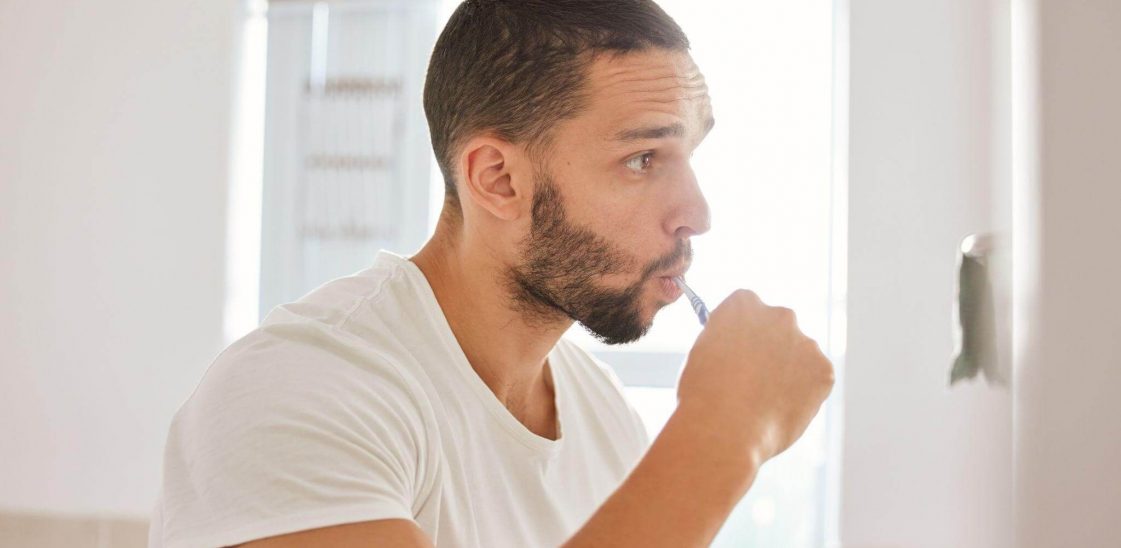
Are you brushing your teeth too hard?
While we all know that maintaining a good oral hygiene routine is essential to keep your teeth clean and healthy, and that failing to brush and floss can lead to a range of dental problems, knowing how to correctly brush is not always clear. With this in mind, one of the most common mistakes made when it comes to brushing your teeth is the pressure applied with your brush. Indeed, while you may think brushing harder will be more effective at removing plaque and dislodging stubborn food particles from your teeth, on the contrary, brushing too hard can actually be harmful to your oral health.[1]
But how do you know if you are brushing too hard? What are the consequences of applying too much pressure when you brush your teeth? And what is the correct way to brush? Read on to find answers to all of these questions and more.
Am I brushing my teeth too hard?
There are a number of telltale signs to look out for that can let you know you are brushing your teeth too hard, putting your oral health in danger. These include:
- A damaged toothbrush
If you are looking for signs that you’re brushing your teeth too hard, the first piece of evidence to examine is your toothbrush. If you are brushing too hard, it is likely that you will damage the bristles of your brush. This is to say, when you purchase a new toothbrush, it will come with upright and rounded bristles. These bristles should remain intact for the entire lifespan of the brush (between three and four months of use). However, when you apply too much pressure when brushing, the bristles of your toothbrush are likely to bend out of shape and look worn out before the regular lifespan of your toothbrush is up. If you notice this is the case, purchase a new toothbrush and try to brush more gently.
- Receding gums
Receding gums are another sign that you are brushing your teeth too hard. This is because excessive pressure while brushing can damage the tissue around your gum line, causing it to recede. This can cause bleeding and additional sensitivity. For this reason, it is a good idea to keep an eye on your gum line to monitor any areas you think may be receding.
- Sensitive teeth
If you have noticed that your teeth have become more sensitive, especially when eating or drinking hot or cold items, this could be a sign you are brushing too hard. Excessive brushing pressure not only causes gums to recede (that can expose sensitive nerve endings), it can also cause you to remove enamel from the surface of your teeth. This leads to sensitivity.[2]
- Areas of teeth looking dull
Finally, if you notice that some areas of your teeth – especially those areas near your gums – are not as bright as the rest of the tooth, you may be brushing too hard. This is because, when you brush too hard, as we have explained above, you can cause your gum line to recede. When this happens, the area of the newly exposed tooth tends to be a darker shade, as until recently it has been covered by gum. This area may continue to grow as you uncover more of your tooth’s root surface if you carry on brushing in the same way.
Can brushing your teeth too hard cause receding gums?
As we have explained above, brushing your teeth too hard can cause receding gums. However, receding gums can also be caused by other factors, including gum disease, plaque and even just age. For this reason, if you notice your gums starting to recede, it is important to visit your dentist.[3]
How hard should you brush your teeth?
As a rule of thumb, it is advised that you should only apply enough pressure to feel the bristles of the brush rubbing against the surface of your teeth. This is to say, the bristles should not appear squashed as you brush, and you certainly should never be able to feel the head of the brush against your teeth or gums. It’s also worth noting that soft-bristled brushes should generally be favoured over medium or hard-bristle alternatives, especially if you have a history of brushing too hard.
How to brush your teeth correctly
Although brushing your teeth may seem like a simple task, there is a proper brushing technique you should be aware of in order to ensure you are cleaning your teeth and gums thoroughly without damaging them. Below we have outlined our top tips for correctly brushing your teeth.[1]
- Choose a soft-bristled toothbrush.
- After placing a pea-sized amount of toothpaste on the bristles, angle the brush at 45 degrees against your teeth and start to brush using small gentle strokes.
- As outlined above, you should be able to feel the bristles against the surfaces of your teeth as you brush, but the bristles should never appear squashed. If they do, you are brushing too hard. To avoid doing this subconsciously, brushing using your non-dominant hand is a useful tip.
- If you are using an electric toothbrush, you should apply no pressure at all as you brush. Simply make sure the bristles are in contact with your teeth and allow the automated movement to do all the work.
Resources:
[1] https://www.nhs.uk/live-well/healthy-teeth-and-gums/how-to-keep-your-teeth-clean/




